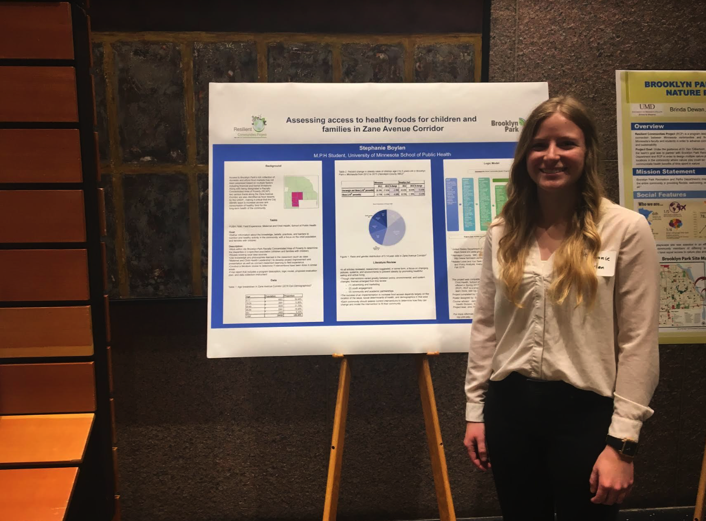By Stephanie Boylan
For my field experience, I worked with the Resilient Communities Project (RCP). The mission of RCP is to connect communities in Minnesota with University of Minnesota faculty and students to advance local sustainability and resilience through collaborative, course-based projects. RCP partnered with Brooklyn Park on 24 projects during the 2016-2017 school-year. These projects are designed to further the city’s strategic planning priorities, which include financial sustainability, focused redevelopment and development, community image, adapting to changing demographics, public safety and strong neighborhoods.

To complete this project I worked with the GIS Coordinator at the City of Brooklyn Park, the RCP Director, and my advisor at the University of Minnesota. I was tasked with assessing access to healthy food for children and families. The Zane Avenue Corridor in Brooklyn Park is defined as a racially concentrated area of poverty and as a food desert. This area was my focus. My tasks were to create a data report showing the disparities for children in this area, write a literature review, and create a logic model for a potential future intervention. My data report includes demographic information including age, race, and income. From 2012 to 2015, obesity rates in 2 to 5 year olds have been going down in Minnesota, but have been going up in Brooklyn Park. I also reported the percentage of students receiving free and reduced price lunch, which is high in the Osseo School District.
My literature review focused on research surrounding previous food access implementation projects such as school gardens, policy change, store marketing, food stamps, and youth engagement. In all articles reviewed, researchers suggested, in some form, a focus on changing policies, systems, and environments to prevent obesity by promoting healthful eating and active living. Though interventions varied greatly between policy, environmental, and system changes, themes emerged from this review. Three common themes were (1) advertising and marketing, (2) youth engagement, and (3) community and academic partnerships. I proposed a youth community gardening program through Zanewood Recreation Center. This program would incorporate youth into a community gardening program, but also provide cooking lessons and community resources to families. Additionally, I created a short evaluation plan and data collection instrument to evaluate the success of the proposed program.
I did a poster presentation showcasing my work at the RCP End-of-Year Celebration in May 2017. I also presented my project at Brooklyn Park City Hall to city staff and the RCP Director.
I enjoyed working on this project, because I felt my academic advisor and RCP director did a great job of tailoring the project to fit my field experience requirements. I am interested in nutrition and physical activity, food access, and food policy. This project regarding food access incorporated all of these components in some capacity, but fit my field experience needs by focusing my assessment on children and families.
I was happily surprised that I incorporated each one of my courses this past semester into my field experience. Without courses like Excel & Access, Evaluation, Qualitative Research, and Grant Writing I would not have been successful with this project. This field experience helped me to see the importance of classroom knowledge and how it applies to the real world. It has also helped me to more clearly understand what classes I want to take in the future and what skills I want to focus on to excel in a career.
Stephanie Boylan is a second year MCH student from Wrightstown, WI. She received a Bachelor of Science degree in Health Sciences from Drake University.
Read Student Spotlight Archives
Interested in learning more about getting a degree in Maternal and Child Health? Visit our MCH Program page for more information.
#UMNMCH #UMNproud #UMNdriven